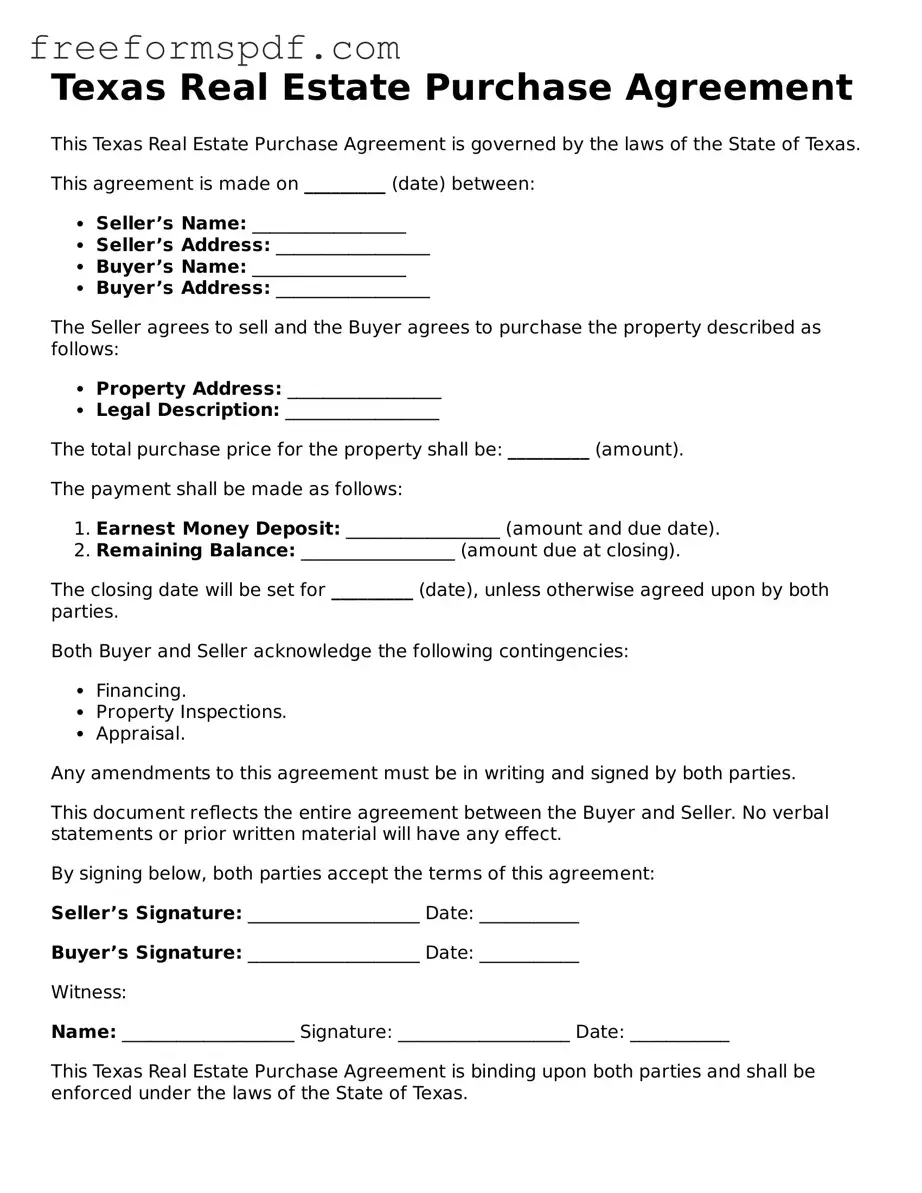Attorney-Verified Real Estate Purchase Agreement Document for Texas State
Common mistakes
-
Incomplete Information: Failing to provide all required details, such as the buyer's and seller's full names, can lead to delays or complications.
-
Incorrect Property Description: Not accurately describing the property, including the address and legal description, may result in disputes later.
-
Omitting Contingencies: Neglecting to include important contingencies, such as financing or inspection clauses, can affect the buyer's ability to back out if issues arise.
-
Misunderstanding Earnest Money: Not specifying the amount of earnest money or the terms surrounding it can create confusion about the buyer's commitment.
-
Failure to Specify Closing Date: Leaving the closing date blank or not agreeing on a date can lead to misunderstandings and scheduling conflicts.
-
Ignoring Additional Terms: Not including any additional terms or agreements discussed can lead to misinterpretations of the deal.
-
Not Initialing Changes: Failing to initial any changes made to the document can cause issues with the validity of those changes.
Learn More on This Form
-
What is a Texas Real Estate Purchase Agreement?
A Texas Real Estate Purchase Agreement is a legal document that outlines the terms and conditions for the sale of real estate property in Texas. It serves as a binding contract between the buyer and seller, detailing the purchase price, financing terms, and any contingencies that must be met before the sale is finalized.
-
What are the key components of this agreement?
The key components of a Texas Real Estate Purchase Agreement include:
- Identification of the parties involved (buyer and seller).
- Description of the property being sold.
- Purchase price and payment terms.
- Contingencies, such as financing or inspection requirements.
- Closing date and possession details.
- Any additional terms or conditions agreed upon by both parties.
-
Do I need a lawyer to complete this agreement?
While it is not legally required to have a lawyer draft or review a Texas Real Estate Purchase Agreement, it is highly recommended. A legal professional can ensure that the document complies with state laws and protects your interests. This is especially important if the transaction involves complex terms or significant financial implications.
-
How do I make changes to the agreement after it has been signed?
Changes to a Texas Real Estate Purchase Agreement can be made through an amendment. Both parties must agree to the changes and sign the amendment for it to be legally binding. It is crucial to document any alterations to avoid misunderstandings later in the transaction.
-
What happens if either party fails to fulfill their obligations?
If either party fails to meet their obligations as outlined in the agreement, it may be considered a breach of contract. The non-breaching party may have the right to seek remedies, which could include financial compensation or specific performance, requiring the breaching party to fulfill their contractual duties.
-
Can I use a standard form for the agreement?
Yes, you can use a standard Texas Real Estate Purchase Agreement form. However, it is essential to ensure that the form complies with Texas laws and is tailored to your specific transaction. Many real estate professionals and legal services offer standardized forms that can be customized for your needs.
-
What is the typical timeline for closing the sale?
The timeline for closing a sale under a Texas Real Estate Purchase Agreement can vary based on several factors, including the terms of the agreement and the responsiveness of both parties. Generally, the closing process takes between 30 to 45 days from the date the agreement is signed, but this can be shorter or longer depending on the circumstances.
Misconceptions
Understanding the Texas Real Estate Purchase Agreement form is crucial for anyone involved in a real estate transaction in Texas. However, several misconceptions can lead to confusion. Here are five common misunderstandings:
- It is a standard form that cannot be modified. Many believe that the Texas Real Estate Purchase Agreement is set in stone. In reality, parties can negotiate and modify terms to fit their specific needs, as long as all changes are documented and agreed upon.
- Only real estate agents can fill out the form. Some think that only licensed agents can complete the agreement. However, buyers and sellers can fill out the form themselves, provided they understand the terms and implications.
- It guarantees a sale. Many assume that signing the agreement means the property is sold. This is not true. The agreement is a step in the process, but it is contingent on various factors, such as financing and inspections.
- It covers all potential issues. Some people think that the agreement addresses every possible concern related to the transaction. While it includes many important elements, it does not cover every scenario. Additional agreements or disclosures may be necessary.
- Once signed, it cannot be changed. A common belief is that after both parties sign the agreement, it cannot be altered. In fact, amendments can be made if both parties agree to the changes in writing.
Being aware of these misconceptions can help you navigate the real estate process more effectively and make informed decisions.
Some Other Real Estate Purchase Agreement State Templates
Oregon Real Estate Purchase Agreement - Addresses potential disputes that may arise between parties.
The California Employment Verification form is a document used to confirm an employee’s job status and details with their current or past employer. This form is an essential tool for various purposes, including loan applications, background checks, and other employment-related processes. For those seeking the necessary documentation, you can find helpful resources at PDF Documents Hub, which can assist you in filling out the form efficiently.
Virginia Real Estate Contract - The agreement often emphasizes the timelines for each step of the transaction process.
Purchasing Agreement - Both parties must sign the agreement for it to be valid.
Pennsylvania Purchase Agreement - The purchase agreement can also address zoning and use restrictions of the property.
